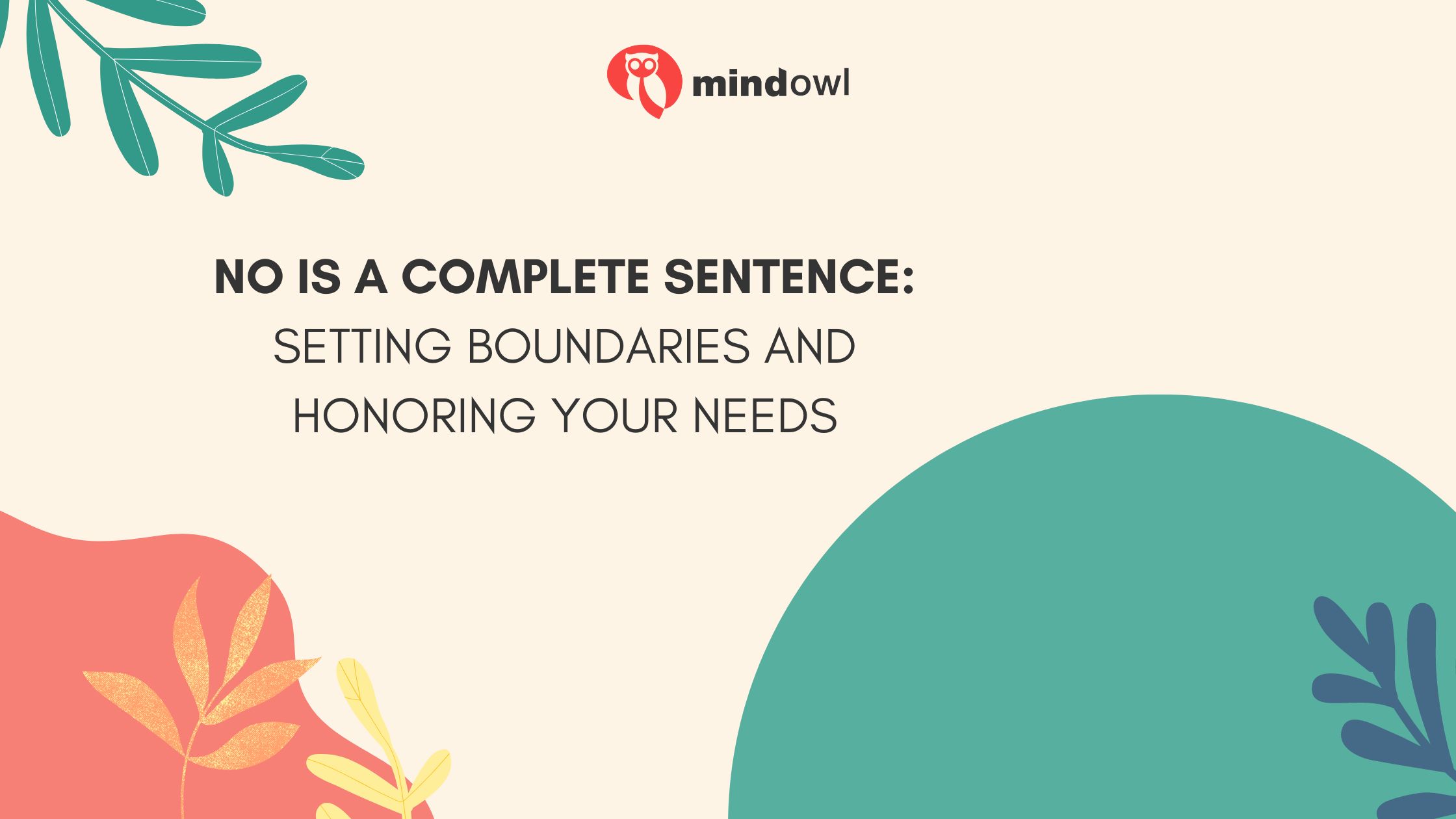
It’s easy to forget the power of saying no in a world where we are constantly flooded with messages about being positive and agreeable. But the truth is, “no” is a complete sentence, and setting boundaries and honouring your needs is essential for maintaining mental and emotional well-being. This concept may seem simple, but in reality, many people struggle with the guilt and fear of disappointing others when they assert their boundaries.
In this article, we will explore the significance of setting boundaries and the positive impact it can have on your life. We will discuss the importance of recognising and honoring your needs, and how doing so can lead to improved relationships, increased self-confidence, and a greater sense of self-worth. By understanding the power of saying “no” and setting boundaries, you can take control of your life and prioritize your own well-being. So, join us as we delve into how embracing the power of “no” can truly transform your life.
Key Takeaways
- Saying “no” saves your time and energy, letting you focus on what’s really important to you.
- Being direct and not using excuses when you say “no” helps make your boundaries clear to others.
- If someone keeps asking after you’ve said “no,” stay calm and say it again to keep your boundaries strong.
The power of saying “no”
Saying “no” can be hard. We don’t want to let people down or miss out on fun stuff. But every time you say “yes” when you really want to say “no”, you give up a bit of your own needs and time.
Think of it like this: saying “no” is taking care of yourself. You set clear lines that show others what’s okay and what’s not for you.
Being able to say “no” nicely shows strength, not weakness. You thank the person for asking but stay firm in your answer, without feeling bad or giving too many reasons why not. This helps keep your mind free from stress and lets you focus on what truly matters to you.
And remember, Dr Bob Dent says that knowing the power behind this little word is all about self-awareness and standing strong in your choices.
Why We Struggle to Say No

Many of us struggle to say no due to our people-pleasing tendencies and the fear of missing out. Cultural expectations also play a role in making it difficult for us to decline requests or set boundaries.
These factors often lead to feelings of guilt and discomfort when we consider saying no.
People pleasing tendencies
People pleasing can trap you in a cycle of saying yes when your heart screams no. You might believe that by always being helpful and never letting people down, they’ll love and value you more.
But this isn’t true. It often leads to feeling used and forming relationships that aren’t satisfying. Instead of bringing joy, it piles on stress as you struggle to meet everyone’s expectations but your own.
Saying “no” feels hard because you don’t want to upset others or seem selfish. But remember, it’s not about being mean; it’s about taking care of yourself. Feelings of guilt may creep in as if you’re doing something wrong by putting your needs first.
However, setting boundaries is healthy, and learning how to decline requests politely is a vital part of personal growth.
Fear of missing out
You might say yes to things because you worry about what you’ll miss if you don’t go or join in. This feeling can be strong and make it hard to say no. You think that something exciting will happen, and you won’t be a part of it.
Or maybe an opportunity comes up, and saying no feels like shutting the door on your future.
Saying no can feel like you’re not being helpful or friendly. You want others to see you as kind and ready for fun. But always saying yes because of fear means your own needs get lost.
It’s important to remember that missing out now doesn’t mean there won’t be another chance later. Saying no gives space for the right yeses – those chances that are truly good for you.
Cultural expectations
Cultural expectations often shape how we act in our relationships. Some cultures see setting boundaries as negative, and people might worry about hurting others’ feelings. In places where the group’s needs are seen as more important than one person’s, saying “no” can be tough.
This makes it hard for some to protect their personal space and time.
Western culture usually supports the idea of making clear lines between yourself and others. It values standing up for your own needs. But even here, many find it tricky to turn down requests from friends, family or workmates without feeling guilty or rude.
Learning to say “no” involves understanding these different cultural rules and finding a balance that works for you.
Now let’s dive into the good things that come with saying “no.”
Benefits of Saying No

Setting boundaries and saying no can protect your time, reduce stress, and allow you to focus on priorities. If you want to learn more about the power of setting boundaries and honoring your needs, keep reading for valuable insights and tips.
Protects your time and energy
Saying “no” saves you time and energy. You get to choose what to do with your day. If you pick only things that are good for you, you have more power over your life. This helps you not waste time on stuff that doesn’t matter to you.
It’s like having a fence around your day. Only the best things can come in, and all the rest stays out. Less stress comes from this choice too. It lets you work hard on what’s really important.
Less wasted energy means doing better at big tasks or goals. Imagine feeling fresh because you didn’t say “yes” when you wanted to say “no”. Now take that feeling into everything else – it makes a huge difference!
Next up: understanding how less stress is another great thing about learning to say “no”.
Reduces stress
After you’ve guarded your time and energy, saying “no” plays a big role in bringing down stress levels. This simple word acts like a shield, keeping out tasks and demands that could overwhelm you.
It lets you breathe easier, knowing you aren’t piling too much on your plate. Life can get busy and complicated, but by choosing what you take on, stress doesn’t have to make you feel buried.
By setting boundaries with a clear “no,” you cut out the noise of unnecessary commitments. This means less worrying about fitting everything in. You give yourself permission to relax and focus on things that are truly important to you without guilt or anxiety pressing down on your shoulders.
Embracing this power helps keep stress at bay so you can thrive.
Allows you to focus on priorities
Lower stress means you can think more about what matters most to you. By saying no, you free up time for your goals and what makes you happy. It may be hard at first, but choosing your priorities shows that you respect yourself and your needs.
This practice can lead to better choices in how you spend your time.
Having clear boundaries helps protect this personal space so that others’ demands don’t take over. This way, instead of always helping someone else or doing things that aren’t important to you, say no confidently.
Use the power of this complete sentence to focus on actions that move your life forward in ways that matter most.
Tips for setting boundaries
Start by setting small boundaries and gradually work your way up to more significant ones. Consistency is key in maintaining boundaries, so be firm in your decisions. Seek support from friends, family, or professionals if you need help navigating this process.
Remember, your needs are important and it’s okay to prioritise them.
Start small
Saying “no” to small things is like a muscle you need to build. Choose easy, low-risk situations where you can practice. Maybe that means turning down an extra task at work or saying no to a social event when you’re tired.
Doing this gets you used to setting boundaries. It also shows you that the world won’t fall apart if you put yourself first sometimes.
Being consistent with these small steps is key. Keep practicing and it will become easier to handle bigger challenges later on. As your confidence grows, so does your ability to protect what’s important: your time, energy, and emotional well-being.
Next up, let’s talk about how firm support from friends or family can help in setting boundaries.
Be consistent
Consistency is key when it comes to setting and enforcing boundaries. By consistently asserting your needs and desires, you send a clear message about your self-worth and priorities.
This consistency helps to build trust and respect in relationships, reinforcing your values and personal leadership in the process. When you’re consistent with your boundaries, it also makes them clear to others, empowering you to take control of your own decisions and well-being.
Now let’s delve into the important topic of “Why We Struggle to Say No”.
Seek support if needed
Seeking support if needed is crucial in learning to set and maintain healthy boundaries. It can help you identify areas where you need more space, self-respect, energy, or personal power.
This support provides guidance in communicating your needs and desires effectively, defining your limitations, and living a more liberated existence. Seeking support can offer a sense of control over your emotional and physical well-being as you work towards setting boundaries that honor your needs and priorities.
How to Communicate “No” Effectively
When communicating “no,” it’s essential to be direct and concise, avoiding excuses or ambiguity. Suggesting alternatives if appropriate can also help maintain healthy relationships while honoring your boundaries.
Be direct and concise
Being direct and straight to the point when setting boundaries is essential. Clearly stating your limits without beating around the bush can effectively communicate your needs to others.
Instead of making excuses or giving lengthy explanations, a simple and firm “no” can convey your stance assertively. This approach helps in fostering respect for your boundaries while minimising misunderstandings.
Phrases such as “I’m not comfortable with that,” or “I need some time to myself right now” enable you to express yourself directly while maintaining politeness and clarity.
Avoid excuses or ambiguity
When it comes to setting boundaries and saying “no,” it’s crucial to be direct and clear. Avoid ambiguous phrases or excuses that can be misinterpreted. Instead, firmly communicate your decision without justifying or explaining too much.
This helps in establishing firm boundaries and conveying respect for your own needs and priorities. Saying “no” without ambiguity also encourages others to understand and acknowledge your stance, fostering healthier relationships built on mutual understanding.
Setting clear boundaries is essential for healthy relationships and self-care practices, as well as demonstrating respect for oneself while respecting others’ needs too. Learning to say “no” confidently contributes significantly to emotional intelligence development and effective conflict management skills, ensuring a balanced approach towards personal well-being.
Suggest alternatives if appropriate
When it comes to setting boundaries and communicating a firm “no,” it’s important to consider suggesting alternatives when appropriate. This approach can include offering compromises, redirecting requests, or expressing willingness for future assistance while politely declining in the present.
By providing alternative solutions or gracefully redirecting requests, individuals can effectively honor their own needs and priorities while maintaining respectful communication with others.
These approaches not only reinforce personal boundaries but also foster positive and constructive interactions in various social and professional settings.
Repeat “no” calmly if tested
When someone tests your boundaries by pushing for a “yes” after you’ve said “no”, calmly repeating your refusal can reinforce your boundary. It communicates assertiveness and emphasises the importance of honouring your needs.
By repeating “no” calmly, you affirm the validity of your initial response and set a clear standard for respecting your boundaries, empowering yourself in the process.
So remember, if tested, confidently reaffirming your “no” helps to establish healthy boundaries and communicates that you respect and prioritise your needs. This simple act empowers you to maintain control over what aligns with your well-being and values.
Setting Healthy Boundaries
Identify your needs and priorities, communicate your boundaries clearly, and make self-care a priority. It’s essential to establish healthy boundaries in all areas of life to protect your well-being and honor your needs.
Identify your needs and priorities
Recognising your needs is the first step in establishing healthy boundaries. This means understanding what is important to you, whether it’s time for yourself, pursuing a career goal, or nurturing meaningful relationships.
Prioritising these needs helps you carve out space for self-care and personal growth, fostering a sense of fulfilment and purpose in life.
Setting boundaries begins with acknowledging your individual requirements. When you recognise and honour your needs and priorities, you create a solid foundation for asserting yourself confidently and respectfully in various aspects of life.
Communicate your boundaries clearly
After identifying your needs and priorities, the next crucial step is to communicate your boundaries clearly. This involves expressing your limits and expectations to others in a direct and concise manner.
Avoid using ambiguous language or making excuses when asserting your boundaries. Instead, be firm and assertive in stating what you are comfortable with and what you are not.
When communicating your boundaries, it’s important to use clear and straightforward language without beating around the bush. Remember that by clearly articulating your needs, you empower yourself to create space for self-respect, personal power, energy, and emotional well-being.
Make self-care a priority
Prioritising self-care is crucial for your overall well-being. It allows you to recharge and maintain a healthy balance in life, reducing stress and enhancing productivity. By setting boundaries that prioritise self-care, you can ensure that your needs are met, creating the space to focus on personal growth, career advancement, and nurturing relationships.
Establishing healthy boundaries enables you to communicate your needs clearly and assertively. By doing so, you empower yourself to say “no” when necessary and allocate time for activities that promote mental and emotional wellness.
This contributes significantly to leading a more fulfilling life while minimising feelings of overwhelm and burnout.
Conclusion: Embracing the Power of “No” and Setting Healthy Boundaries.
In conclusion, setting healthy boundaries is empowering. Saying “no” is a complete sentence that honours your needs. It creates safety and happiness in your life. Embracing the freedom to prioritise your well-being is transformative.
Setting boundaries allows you to step into your power and lead authentically. It’s crucial for personal leadership and self-respect.
FAQs
1. Why is it important to say “no”?
Saying “no” helps you take care of yourself by setting boundaries. It means you’re not doing things that make you uncomfortable or aren’t right for you.
2. What if I feel bad when I don’t help others?
Remember, it’s key to look after your own needs too. You can’t pour from an empty cup, so taking care of yourself isn’t selfish; it’s necessary.
3. How do I start saying “no” if I’m not used to it?
Begin with small steps. Practice politely declining things that aren’t a priority for you. The more you do it, the more comfortable it will become.
4. Can saying “no” affect my relationships?
It might change them, but setting clear limits can lead to healthier and more supportive connections with people who respect your needs.
5. Will people think badly of me for saying “no”?
Some might be surprised at first, especially if they’re used to hearing “yes.” Stand firm and know that honoring your needs matters most.
6. Is learning to say “no” only about refusing requests from others?
Not just that! It’s also about making decisions true to your beliefs and morals, even when facing the lure of instant gratification or fear of loneliness.
MindOwl Founder – My own struggles in life have led me to this path of understanding the human condition. I graduated with a bachelor’s degree in philosophy before completing a master’s degree in psychology at Regent’s University London. I then completed a postgraduate diploma in philosophical counselling before being trained in ACT (Acceptance and commitment therapy).
I’ve spent the last eight years studying the encounter of meditative practices with modern psychology.

